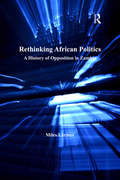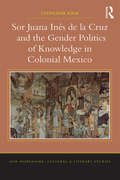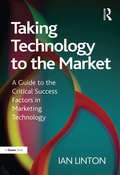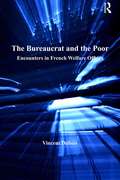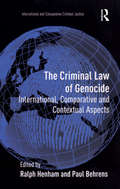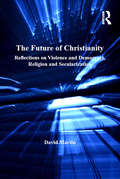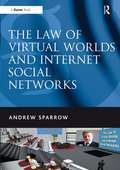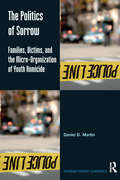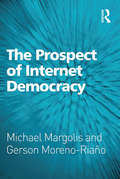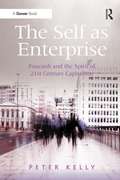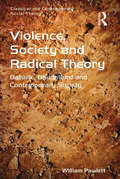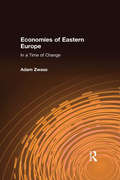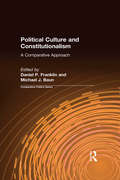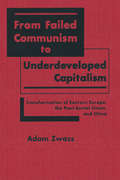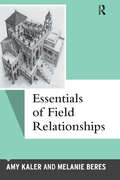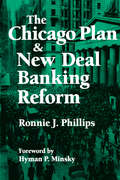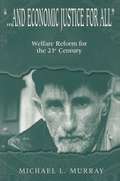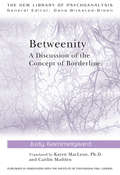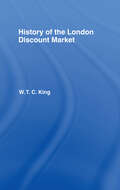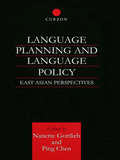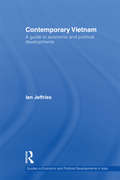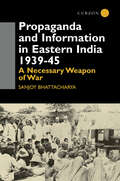Special Collections
Benetech’s Global Certified Accessible Titles
Description: Benetech’s GCA program is the first independent third-party EPUB certification to verify ebook accessibility. By creating content that is born accessible, publishers can meet the needs of all readers. Learn more: https://bornaccessible.benetech.org/
- Table View
- List View
Rethinking African Politics
by Miles LarmerIn 1964 Kenneth Kaunda and his United National Independence Party (UNIP) government established the nation of Zambia in the former British colony of Northern Rhodesia. In parallel with many other newly independent countries in Africa this process of decolonisation created a wave of optimism regarding humanity's capacity to overcome oppression and poverty. Yet, as this study shows, in Zambia as in many other countries, the legacy of colonialism created obstacles that proved difficult to overcome. Within a short space of time democratisation and development was replaced by economic stagnation, political authoritarianism, corruption and ethnic and political conflict. To better understand this process, Dr Larmer explores UNIP's political ideology and the strategies it employed to retain a grip on government. He shows that despite the party's claim that it adhered to an authentically African model of consensual and communitarian decision-making, it was never a truly nationally representative body. Whereas in long-established Western societies unevenness in support was accepted as a legitimate basis for party political difference, in Zambia this was regarded as a threat to the fragile bindings of the young nation state, and as such had to be denied and repressed. This led to the declaration of a one-party state, presented as the logical expression of UNIP supremacy but it was in fact a reflection of its weakening grip on power. Through case studies of opposition political and social movements rooted in these differences, the book demonstrates that UNIP's control of the new nation-state was partial, uneven and consistently prone to challenge. Alongside this, the study also re-examines Zambia's role in the regional liberation struggles, providing valuable new evidence of the country's complex relations with Apartheid-era South Africa and the relationship between internal and external opposition, shaped by the context of regional liberation movements and the Cold War. Drawing on extensive archival research and interviews, Dr Larmer offers a ground-breaking analysis of post-colonial political history which helps explain the challenges facing contemporary African polities.
Saviour Siblings and the Regulation of Assisted Reproductive Technology
by Malcolm K. SmithAdvances in the field of Assisted Reproductive Technology (ART) have been revolutionary. This book focuses on the use of ARTs in the context of families who seek to conceive a matching sibling donor as a source of tissue to treat an existing sick child. Such children have been referred to as 'saviour siblings'. Considering the legal and regulatory frameworks that impact on the accessibility of this technology in Australia and the UK, the work analyses the ethical and moral issues that arise from the use of the technology for this specific purpose. The author claims the only justification for limiting a family's reproductive liberty in this context is where the exercise of reproductive decision-making results in harm to others. It is argued that the harm principle is the underlying feature of legislative action in Western democratic society, and as such, this principle provides the grounds upon which a strong and persuasive argument is made for a less-restrictive regulatory approach in the context of 'saviour siblings'. The book will be of great relevance and interest to academics, researchers, practitioners and policy makers in the fields of law, ethics, philosophy, science and medicine.
Sor Juana Inés de la Cruz and the Gender Politics of Knowledge in Colonial Mexico
by Stephanie KirkEach of the book's five chapters evokes a colonial Mexican cultural and intellectual sphere: the library, anatomy and medicine, spirituality, classical learning, and publishing and printing. Using an array of literary texts and historical documents and alongside secondary historical and critical materials, the author Stephanie Kirk demonstrates how Sor Juana used her poetry and other works to inscribe herself within the discourses associated with these cultural institutions and discursive spheres and thus challenge the male exclusivity of their precepts and precincts. Kirk illustrates how Sor Juana subverted the masculine character of erudition, writing herself into an all-male community of scholars. From there, Sor Juana clearly questions the gender politics at play in her exclusion, and undermines what seems to be the inextricable link previously forged between masculinity and institutional knowledge. Sor Juana Inés de la Cruz and the Gender Politics of Knowledge in Colonial Mexico opens up new readings of her texts through the lens of cultural and intellectual history and material culture in order to shed light on the production of knowledge in the seventeenth-century colonial Mexican society of which she was both a product and an anomaly.
Taking Technology to the Market
by Ian LintonWith intensifying competitive activity and continuing budget constraints, technology marketing teams are under pressure to be more accountable and deliver measurable results that demonstrate an effective return on investment. To add to the complexity, the market for technology products and services is global, with continuing growth in both developed and developing territories. Taking Technology to the Market provides a practical guide to the critical success factors in marketing technology. It uses a project-based approach, providing comprehensive guidelines for key strategic and tactical marketing programmes. The book will help you improve your chances of developing a winning marketing programme by providing essential steps to success and insight into best practice. Individual chapters provide self-contained guides to planning specific marketing tasks. The range of tasks covers the most common challenges facing marketing teams in technology companies. The book will help you understand the key success factors for overcoming a range of marketing challenges and give you the tools to put specific programmes into action quickly and effectively. The technology sector is a global business characterised by short product cycles, rapid change, longer-term customer relationships, complex decision-making processes, high levels of collaboration and partnership with customers and the supply chain, diverse channels to market and an emphasis on the value of information. These factors make the marketing of technology products and services a distinct discipline within the overall marketing spectrum to which Taking Technology to the Market is the definitive guide.
The Bureaucrat and the Poor
by Vincent DuboisWelfare offices usually attract negative descriptions of bureaucracy with their queues, routines, and impersonal nature. Are they anonymous machines or the locus of neutral service relationships? Showing how people experience state public administration, The Bureaucrat and the Poor provides a realistic view of French welfare policies, institutions and reforms and, in doing so, dispels both of these myths. Combining Lipsky's street-level bureaucracy theory with the sociology of Bourdieu and Goffman, this research analyses face-to-face encounters and demonstrates the complex relationship between welfare agents, torn between their institutional role and their personal feelings, and welfare applicants, required to translate their personal experience into bureaucratic categories. Placing these interactions within the broader context of social structures and class, race and gender, the author unveils both the social determinations of these interpersonal relationships and their social functions. Increasing numbers of welfare applicants, coupled with mass unemployment, family transformations and the so-called 'integration problem' of migrants into French society deeply affect these encounters. Staff manage tense situations with no additional resources - some become personally involved, while others stick to their bureaucratic role; most of them alternate between involvement and detachment, assistance and domination. Welfare offices have become a place for 're-socialisation', where people can talk about their personal problems and ask for advice. On the other hand, bureaucratic encounters are increasingly violent, symbolically if not physically. More than ever, they are now a means of regulating the poor.
The Criminal Law of Genocide
by Paul BehrensThis collection of essays presents a contextual view of genocide. The authors, who are academic authorities and practitioners in the field, explore the legal treatment, but also the social and political concepts and historical dimensions of the crime. They also suggest alternative justice solutions to the phenomenon of genocide. Divided into five parts, the first section offers an historical perspective of genocide. The second consists of case studies examining recent atrocities. The third section examines differences between legal and social concepts of genocide. Part four discusses the treatment of genocide in courts and tribunals throughout the world. The final section covers alternatives to trial justice and questions of prevention and sentencing.
The Future of Christianity
by David MartinThis book offers a mature assessment of themes preoccupying David Martin over some fifty years, complementing his book On Secularization. Deploying secularisation as an omnibus word bringing many dimensions into play, Martin argues that the boundaries of the concept of secularisation must not be redefined simply to cover aberrant cases, as when the focus was more on America as an exception rather than on Europe as an exception to the 'furiously religious' character of the rest of the world. Particular themes of focus include the dialectic of Christianity and secularization, the relation of Christianity to multiple enlightenments and modes of modernity, the enigmas of East Germany and Eastern Europe, and the rise of the transnational religious voluntary association, including Pentecostalism, as that feeds into vast religious changes in the developing world. Doubts are cast on the idea that religion has ever been privatised and has lately reentered the public realm. The rest of the book deals with the relation of the Christian repertoire to the nexus of religion and politics, including democracy and violence and sharply criticises polemical assertions of a special relation of religion to violence, and explores the contributions of 'cognitive science' to the debate
The Law of Virtual Worlds and Internet Social Networks
by Andrew SparrowVirtual worlds are the latest manifestation of the internet's inexorable appetite for development. Organisations of all kinds are enthusiastically pursuing the commercial opportunities offered by the growth of this phenomenon. But if you believe that there are no laws which govern internet social networks and virtual worlds this book will persuade you otherwise. There is law, and a good deal of it. Why would there not be? As with many other aspects of the world wide web, this new medium is unregulated and offers many opportunities for companies to damage their reputation, run into a whole host of problems relating to intellectual property, trade marks and copyrights, and compromise the rights of individuals participating within the virtual environment. By reading The Law of Virtual Worlds and Internet Social Networks you will gain a good understanding of the legal issues which govern this expanding and fascinating world - are you ready for the leap from internet plaything to meaningful social and business tool? The Law of Virtual Worlds and Internet Social Networks is an essential reference for advertising and media agencies; television broadcast producers; academic institutions including university law, knowledge and information departments. In fact, it has been written for anyone interested in virtual worlds and social networks whether commercially because you want to explore the possibilities such environments present, or for academic curiosity.
The Literary Imagination from Erasmus Darwin to H.G. Wells
by Michael R. PageAt the close of the eighteenth century, Erasmus Darwin declared that he would 'enlist the imagination under the banner of science,' beginning, Michael Page argues, a literary narrative on questions of evolution, ecology, and technological progress that would extend from the Romantic through the Victorian periods. Examining the interchange between emerging scientific ideas-specifically evolution and ecology-new technologies, and literature in nineteenth-century Britain, Page shows how British writers from Darwin to H.G. Wells confronted the burgeoning expansion of scientific knowledge that was radically redefining human understanding and experience of the natural world, of human species, and of the self. The wide range of authors covered in Page's ambitious study permits him to explore an impressive array of topics that include the role of the Romantic era in the molding of scientific and cultural perspectives; the engagement of William Wordsworth and Percy Shelley with questions raised by contemporary science; Mary Shelley's conflicted views on the unfolding prospects of modernity; and how Victorian writers like Charles Kingsley, Samuel Butler, and W.H. Hudson responded to the implications of evolutionary theory. Page concludes with the scientific romances of H.G. Wells, to demonstrate how evolutionary fantasies reached the pinnacle of synthesis between evolutionary science and the imagination at the close of the century.
The Politics of Sorrow
by Daniel D. MartinDrawing on several years of research with grief support organizations and the families and friends of murdered children, this book examines the emotional experience of families in the aftermath of a homicide. It examines the politics of sorrow, offering a comparative analysis of White and African-American families as they navigate the experience of homicide, shedding light on the ways in which the class location or ethnicity of mourners affects their experience. Analyzing the manner in which police and other authorities differentially extend emotional support to bereaved families, notify them of a homicide, or assign blame, The Politics of Sorrow reveals how 'disenfranchised grief' comes to be an institutionalized outcome of their practice. The book further examines the effects of 'announcement shock' and the importance to the family of the moral career of the deceased, as they seek to manage his or her identity, often dealing with their grief through an active pursuit of justice in court, or through political involvement with a grief support organization, which mobilizes families in pursuit of its political ends. A rigorous study of stigma, identity, and stratified experiences of grief, The Politics of Sorrow will appeal to sociologists interested in interactionist methods, race, class, and emotion.
The Prospect of Internet Democracy
by Michael Margolis and Gerson Moreno-RiañoThe internet opens up new opportunities for citizens to organize and mobilize for action but it also provides new channels that established political, social and economic interests can use to extend their powers. Will the internet revolutionize politics? The Prospect of Internet Democracy is a rich and detailed exploration of the theoretical implications of the internet and related information and communication technologies (ICTs) for democratic theory. Focusing in particular on how political uses of the internet have affected or seem likely to affect patterns of influence among citizens, interest groups and political institutions, the authors examine whether the internet's impact on democratic politics is destined to repeat the history of other innovative ICTs. The volume explores the likely long-term effects of such uses on the conduct of politics in the USA and other nations that declare themselves modern democracies and assesses the extent to which they help or hinder viable democratic governance.
The Self as Enterprise
by Peter KellyTwenty first century, flexible capitalism creates new demands for those who work to acknowledge that all aspects of their lives have come to be seen as performance related, and consequently of interest to those who employ them (or fire them). At the start of the 21st century we can identify, borrowing from Max Weber, new work ethics that provide novel ethically slanted maxims for the conduct of a life, and which suggest that the cultivation of the self as an enterprise is the life-long activity that should give meaning, purpose and direction to a life. The book provides an innovative theoretical and methodological approach that draws on the problematising critique of Michel Foucault, the sociological imagination of Zygmunt Bauman and the work influenced by these authors in social theory and social research in the last three decades. The author takes seriously the ambivalence and irony that marks many people’s experience of their working lives, and the demands of work at the start of the 21st century. The book makes an important contribution to the continuing debate about the nature of work related identities and the consequences of the intensification of the work regimes in which these identities are performed and regulated. In a post global financial crisis (GFC) world of sovereign debt, austerity and recession the author’s analysis focuses academic and professional interest on neo-liberal injunctions to imagine ourselves as an enterprise, and to reap the rewards and carry the costs of the conduct of this enterprise.
The Theology of John Zizioulas
by Douglas H. KnightJohn Zizioulas is widely recognised as the most significant Orthodox theologian of the last half century and acclaimed advocate of ecumenism. From his indepth knowledge of the intellectual resources of the Church, Zizioulas has argued that the Church Fathers represent a profound account of freedom and community that represents a radical challenge to modern accounts of the person. Zizioulas uses the work of the Fathers to make an important distinction between the person, who is defined by a community, and the individual who defines himself in isolation from others, and who sees community as a threat to his freedom. Zizioulas argues that God is the origin of freedom and community, and that the Christian Church is the place in which the person and freedom come into being. This volume offers a critical appraisal of the theology of John Zizioulas. Leading Anglican, Reformed, Catholic and Orthodox international scholars, including Colin Gunton, Nicholas Loudovikos, Paul McPartlan, Wolfhart Pannenberg and Philip Rosato present essays which analyse Zizioulas' trinitarian doctrine of God, and his theological account of the Church as the place in which freedom and communion are actualised. Many include discussions of Zizioulas' Being as Communion as well as other lesser known works, now available in Communion and Otherness. Together they represent an unrivalled introduction to the work of this great theologian.
Violence, Society and Radical Theory
by William PawlettShedding light on the relationship between violence and contemporary society, this volume explores the distinctive but little-known theories of violence in the work of Georges Bataille and Jean Baudrillard, applying these to a range of violent events - events often labelled ’inexplicable’ - in order to show how even the most extreme of acts can be seen as socially meaningful. The book offers an understanding of violence as fundamental to social relations and social organisation, departing from studies that focus on individual offenders and their psychological states to concentrate instead on the symbolic relations or exchanges between agents and between agents and the structures they find themselves inhabiting. Developing the notion of symbolic economies of violence to emphasise the volatility and ambivalence of social exchanges, Violence, Society and Radical Theory reveals the importance to our understanding of violence, of the relationship between the structural or systemic violence of consumer capitalist society and forms of ’counter-violence’ which attack this system. A theoretically rich yet grounded expansion of that which can be considered meaningful or thinkable within sociological theory, this ground-breaking book will appeal to scholars and students of social and political theory and contemporary philosophy.
Economies of Eastern Europe in a Time of Change
by Adam ZwassThe development and use of the atomic bombs at Hiroshima and Nagasaki number among the formative national experiences for both Japanese and Americans as well as for 20th-century Japan-US relations. This volume explores the way in which the bomb has shaped the self-image of both peoples.
Political Culture and Constitutionalism
by Daniel P. Franklin and Michael J. BaunThis work is a cross-national examination of the relationship between political culture and constitutionalism. The countries studied include Nigeria, Turkey and Japan. Questions explored include whether constitutions must evolve and whether constitutionalism is only a western concept.
From Failed Communism to Underdeveloped Capitalism
by Adam ZwassThis text presents an analysis of the sources and general features of the current political and economic situation in the reforming countries of Central and Eastern Europe, the former Soviet Union and China.
Essentials of Field Relationships
by Amy Kaler and Melanie BeresField research can consist of trekking across the globe to study peoples in exotic cultural settings. It can also mean strapping on your running shoes and observing behavior at the local market. Regardless of whether the researcher is “at home” or away, the development of research relationships is paramount to the success of the research project. In this book, the authors provide guidance to researchers on developing relationships in their field research. Using a myriad of examples from projects in a wide range of settings, Kaler and Beres offer helpful hints about how to navigate the personal side of conducting research—establishing and maintaining relationships, handling ethical dilemmas, and identifying how the personal identity of researchers help shape their projects.
The Chicago Plan and New Deal Banking Reform
by Hyman P. Minsky and Ronnie J. PhillipsThis work presents a comprehensive history and evaluation of the role of the 100 percent reserve plan in the banking legislation of the New Deal reform era from its inception in 1933 to its re-emergence in the current financial reform debate in the US.
...and Economic Justice for All
by Michael L. MurrayThe author presents an argument for a system of social insurance that replaces welfare with a Guaranteed Adequate Income. The book reviews public assistance programmes, and evaluates other plans that have been proposed.
Betweenity
by Judy GammelgaardFrom its inception psychoanalysis has sought to effect a cure through the therapeutic relationship between analyst and analysand. Betweenity looks at what happens when the established framework of the psychoanalytic process is challenged by those with borderline personalities. In this book Judy Gammelgaard looks at how we might understand the analysand who is unable to engage with therapy and how we might bring them to a point where they are able to do so. Areas of discussion include: the border between psychiatry and psychoanalysis early mother-child relationships the splitting of the ego. This book will be essential reading for all psychoanalysts, psychotherapists and practitioners wishing to learn more about working with borderline personality structures and disorders.
History of the London Discount Market
by W. T. KingFirst Published in 1972. Routledge is an imprint of Taylor & Francis, an informa company.
Language Planning and Language Policy
by Nanette Gottlieb and Ping ChenExamines the major issues of language planning and policy in Japan, Mainland China, Hong Kong, Taiwan, Korea and Vietnam, particularly those relating to the selection of official language, script, and written language.
Contemporary Vietnam
by Ian JeffriesThis book provides full details of contemporary economic and political developments in Vietnam. It continues the overview of developments up to late 2005 which were covered in the author’s Vietnam: A Guide to Economic and Political Developments (also published by Routledge, 2006). Key topics covered include Vietnam's success, in general, in maintaining high rates of growth in the face of problems such as inflation and the global financial crisis; continuing economic reforms; foreign trade and investment; battles against corruption; population growth; the determination of the Communist Party to maintain its hold on power; and Vietnam's response to public health problems such as AIDS, SARS and bird flu.
Propaganda and Information in Eastern India 1939-45
by Sanjoy BhattacharyaThis is a study of the social, political, economic and public health aspects of the Second World War in South Asia, with particular attention being accorded to colonial Eastern India, which was treated as a single administrative unit during the course of the conflict for strategic purposes. The conclusion deals with the long term effects of the war: its effects on political formations, bureaucratic re-negotiation and the de-colonisation of the British Indian empire.
